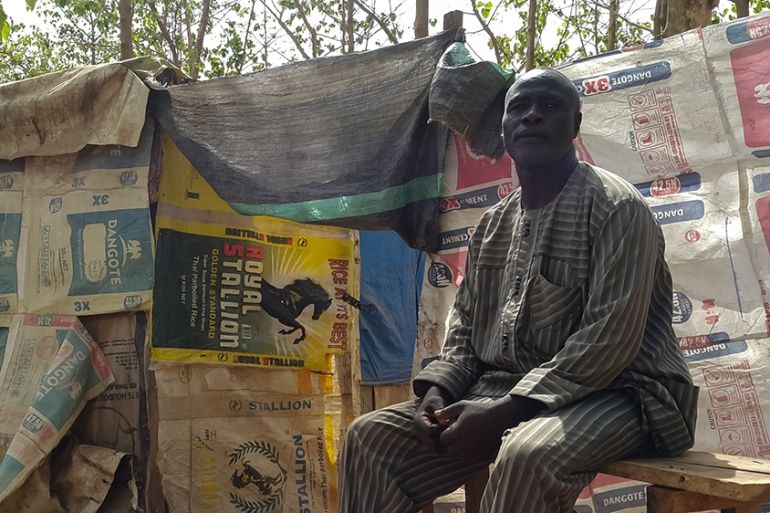Thousands displaced by Boko Haram languish in Abuja IDP camps
Dire living conditions in Nigeria’s capital for thousands who escaped the armed group’s violence in the northeast.

Abuja, Nigeria – It’s a few minutes past 9am and Sunana Ibrahim Wariga’s daily struggle is just beginning. Wariga, a stocky 56-year old, is one of thousands who call Durumi camp in the capital home.
He escaped the deadly Boko Haram rebellion in his home state of Borno more than three years ago.
Keep reading
list of 4 itemsTen years after Chibok girls kidnapping: One woman’s struggle to move on
Ten years after ‘Bring Back Our Girls,’ Nigeria’s kidnappings continue
Why mass kidnappings still plague Nigeria a decade after Chibok abductions
“I used to be a farmer in Chinene village. They attacked my village and seized all my harvest. What they could not carry they burned,” the husband of two wives told Al Jazeera, as children in school uniforms played nearby.
“They burned 200 bags of beans that I harvested. We had to run for our lives. I had everything I wanted in life. I was paying the university fees of two of my children. Now, I can’t feed myself let alone feed them,” Wariga, a father of 10, said as he waited patiently for anyone to offer him a day job.
The eight-year campaign of violence by Boko Haram, which roughly translates to “Western education is forbidden”, has killed more than 20,000 people and displaced about 2.6 million others.
‘Miserable’
Despite the government’s military offensive against the armed group, which wants to establish a strict interpretation of Islamic law, Boko Haram has continued to carry out deadly attacks in northern Nigeria.
Many displaced by the violence have fled not just to other parts of Africa’s most populous country but also to neighbouring states. In Abuja, there are more than 10,000 people who escaped the country’s dangerous northeast to the city, according to a spokesman for IDPs.
“There are 3,000 people in this camp alone. People have been here for five years. There is no food, no water, no healthcare and schools for the children. Life here is very tough, it is miserable,” Idriss Ibrahim Halilu, a spokesman and coordinator for the Durumi IDP camp, told Al Jazeera.
![Most of the children in Durumi IDP camp do not attend school [Hamza Mohamed/Al Jazeera]](/wp-content/uploads/2018/03/94010833e4f94ff09a0280885749033d_18.jpeg)
Most internally displaced people try their luck in Abuja doing manual labour, but only a fortunate few find jobs to make ends meet. Others depend on handouts from good Samaritans.
Next to a dusty playground on the edge of the camp, a mother sits on a small piece of stone as the morning sun beats down on her face, palms on her cheeks.
Zaynab Umoru, 32, heard there is a charity organisation coming to provide food. It is almost midday but there is no sign of any such activity.
“I got here four hours ago and so far no one is here. For two days, we have not cooked any food at home. Life is unbearable here,” the mother of seven told Al Jazeera.
Umoru, like Wariga, moved to Abuja from Borno state. She’s been living in the camp for four years.
“They came to our village at 5am in the morning and start firing. They gunned down any men they saw. We dressed our sons and husbands in women clothes before we escaped,” Umoru said in a soft voice.
|
|
‘Better to die with dignity?’
The internally displaced here say they feel abandoned by their government as basic essentials are not being provided.
But the Nigerian government says it is doing all in its power to meet their humanitarian needs, not just in the capital, but across the country.
“IDPs issues have always been and will always be a priority for our government,” Bitrus Samuel, the National Emergency Management Agency’s head in Abuja, told Al Jazeera.
“Since the beginning of the insurgency, the government has been providing for the humanitarian needs of IDPs in all designated camps: Borno, Yobe, and Adamawa states, including the FCT [federal capital territory], despite the fact that it is not an officially designated IDP camp.”
The agency has worked with NGOs and faith-based organisations in providing job-training skills “to sustain their livelihoods and make them self-sufficient and independent”, Samuel added.
The displaced here want to return to their homes, but the armed group continues to wage its violent campaign.
Last month, Boko Haram kidnapped 110 girls from a boarding school in Dapchi in Yobe state, in Nigeria’s northeast. Nearly all were later released with the armed group warning them to never return to school.
For many of IDPs in Abuja, the danger is too great for them to consider returning to their villages. But for Wariga, it is an option he is seriously considering.
“Yes, Boko Haram might kill me if I go back, but is it not better to die with dignity than to live this life?” he asked, pointing at the squalid shacks that thousands call home in the camp.
Follow Hamza Mohamed on Twitter: @Hamza_Africa